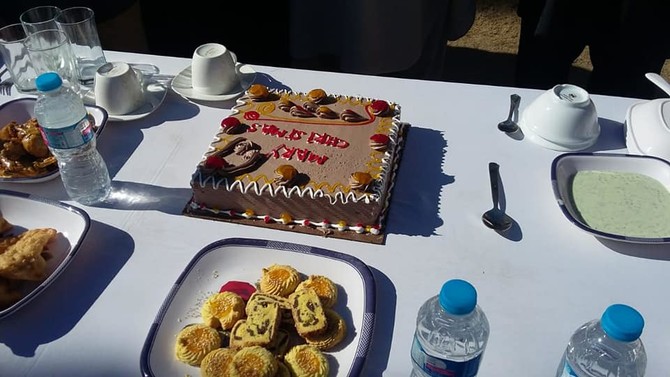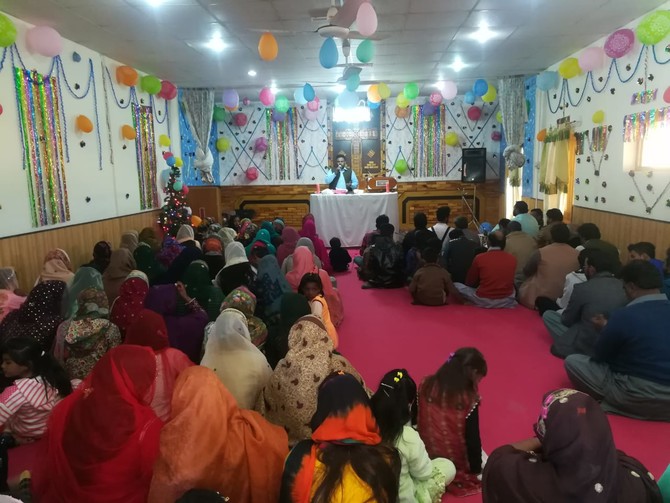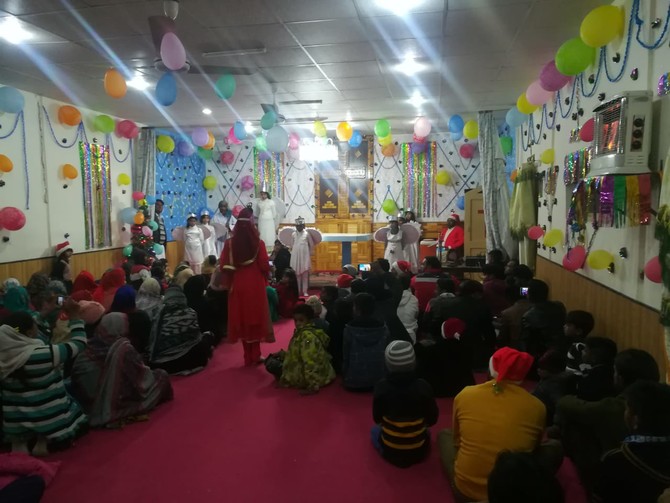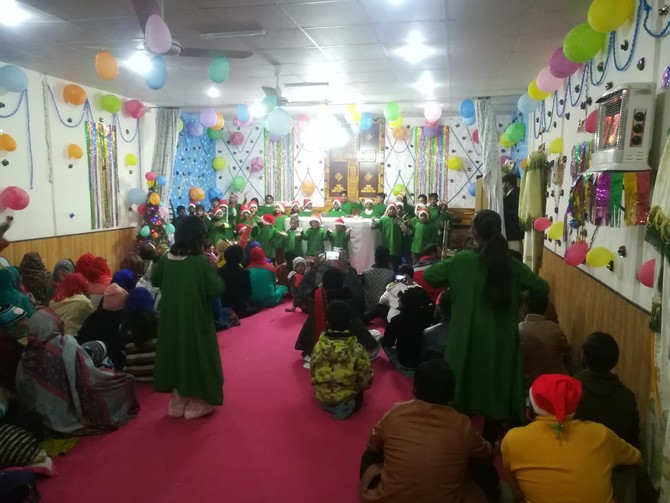DERA ISMAIL KHAN: Once threatened by militant networks, members of a small Christian community in Pakistan’s South Waziristan tribal district celebrated Christmas with prayers for peace and prosperity of the country on Tuesday.
The event took place in their church, the only one of its kind, in Wana which is the district’s headquarters.
Surrounded by a mountainous terrain, the church’s building is located in the heart of Wana — a tribal region along the Pakistan-Afghanistan border — long considered as a terrorist sanctuary and one of the most dangerous places in the world.
“Christmas celebrations were held with enthusiasm with our community decorating their homes and the church, here in Wana, with colorful lights and posters. Around 500 members gathered at the church to offer prayers for the solidarity of the country,” Pastor Zeeshan Alam told Arab News by phone from Wana.
Walking through a small alleyway leads you to a few shops in the area where shopkeepers sell decorative items such as handmade figurines of Santa Claus, glass eggs, and other ornaments.
Until recently, the tribal belt was part of the Federally Administered Tribal Areas (FATA) of Pakistan. That was before South Waziristan, along with six other agencies, was merged with the Khyber Pakhtunkhwa (KP) province earlier this year.
Alam recalls a time when — following military operations in the region — security was a major issue, something which has improved with time, so much so that the tiny Christian community celebrates their religious festival without any fear.
When contacted by Arab News, KP Inspector General of Police Salahuddin Mehsud said that stringent security measures have been put in place to thwart any untoward incidents.
“Throughout KP, we have identified around 85 churches and up to 20 other sites where Christmas celebrations will be held. I have directed all district police officers to remain in close coordination with the Christian community to ensure heightened security,” the IGP added.
He said that 3,800 police personnel have been deployed across the region for this purpose with mobile patrolling and routine visits by supervisory officers also in place.
Alam said that they are satisfied with the security arrangements, adding that peace has been restored throughout the country in general, and in KP and other newly-merged districts in particular, due to the active role played by the police and the army.
The church’s foundation stone was laid in January 2000 in a ceremony that had seen several civil and military officials in attendance. This was done in response to several requests lodged by residents of the Christian community in the South Waziristan Scouts’ camp.
Talking to Arab News, Ali Wazir, a member of the National Assembly (MNA) from the South Waziristan tribal district said that though the Christian community in his area lives in a secure zone, plans were in place to hold regular meetings with them and the officials concerned in the next couple of weeks to resolve any problems, such as the provision of a separate land for their graveyard and a school for the children.
“I think locals have no problem with the Christian community in Wana and they have been living together with complete religious harmony for years now. I cannot remember a single incident of violence against members of the community for decades now,” Wazir said.
Fiaz Masih Nasir, a Christian who lives in Islamabad, said that he was shocked to learn that his community members live in Wana, one of the most volatile tribal regions.
“It gives me great pleasure to see religious harmony prevailing in our country and on this day we pray for greater peace,” Nasir said.
Pastor Alam added that Christmas celebrations were held in complete harmony in the tribal area. “The prayer sessions at the church have concluded amid prayers for religious harmony and solidarity of the country,” he said.
Pakistan’s tribal districts’ only church celebrates Christmas with great zeal
Pakistan’s tribal districts’ only church celebrates Christmas with great zeal

- Christians from a tribal region of South Waziristan district celebrate Christmas
- Community members from elsewhere in Pakistan said they were shocked to learn of their presence in volatile region
Pakistani PM hopes Sharaa assuming president’s office will bring peace to Syria

- Al-Sharaa was declared president for a transitional phase on Wednesday, less than two months after he led a campaign that toppled Bashar Assad
- Sharaa said he will form an inclusive transitional government that will build institutions and run the country until it can hold free and fair elections
ISLAMABAD: Pakistan Prime Minister Shehbaz Sharif on Saturday welcomed Ahmed Al-Sharaa’s assumption of the office of the Syrian president, hoping it would lead to peace in Syria.
Sharaa was declared president for a transitional phase on Wednesday, less than two months after he led a campaign that toppled Bashar Assad.
He was also empowered to form a temporary legislative council for a transitional period and the Syrian constitution was suspended.
“We welcome Mr. Ahmed Al-Sharaa’s assumption of office as President of the Syrian Arab Republic during the transitional phase and hope that the new leadership will be able to bring peace, progress and prosperity to the brotherly people of Syria,” Sharif said on X.

On Thursday, Sharaa said he will form an inclusive transitional government representing diverse communities that will build institutions and run the country until it can hold free and fair elections.
He was addressing the nation in his first speech since being appointed president by the military command that ousted Assad in a lightning offensive last year.
The group that led the offensive, Hayat Tahrir Al-Sham, has since set up an interim government that has welcomed a steady stream of senior Western and Arab diplomatic delegations keen to help stabilize the country after 13 years of civil war.
Pakistan army chief vows retaliation after militant attack kills 18 troops in Balochistan

- Pakistani forces suffered casualties when they engaged militants who had erected barricades on a key highway in Kalat district late Friday
- Balochistan has for years been the scene of an insurgency, with several separatist groups staging attacks and targeting mainly security forces
ISLAMABAD: Pakistan’s army chief, General Asim Munir, on Saturday visited the southwestern Balochistan province after militants killed 18 Pakistani soldiers in the restive region, promising to hunt down the perpetrators of attacks on Pakistani security forces.
General Munir was given a comprehensive brief on the prevailing security situation in Balochistan during his visit, according to the Inter-Services Public Relations (ISPR), the Pakistani military’s media wing.
He offered funeral prayers for the deceased soldiers and later inquired after the injured ones at the Combined Military Hospital in Balochistan’s provincial capital of Quetta.
“Those who are acting as terrorist proxies of their foreign masters who have mastered the art of manifesting double standards of hunting with the hound and running with the hare are well known to us. No matter what these so called ‘frenemies’ may do, you will surely be defeated by the resilience of our proud nation and its Armed Forces,” the army chief was quoted as saying by the ISPR.
“For the defense of our motherland and its people, we will definitely retaliate and ‘hunt you down,’ whenever required and wherever you may be.”
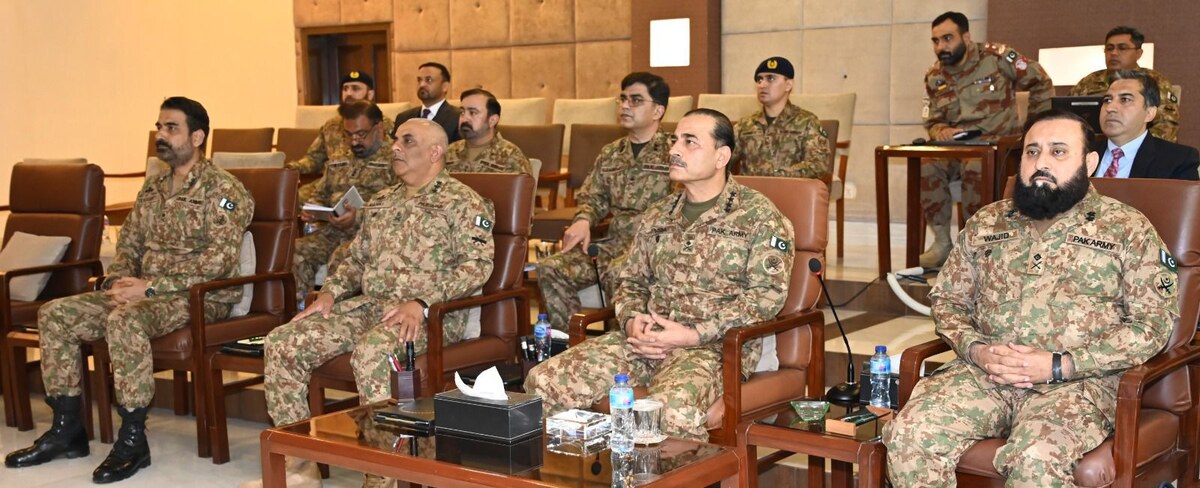
Pakistani forces suffered the casualties when they engaged militants who had erected barricades on a key highway in Balochistan’s Kalat district late on Friday night. The banned Baloch Liberation Army (BLA), one of the most prominent separatist groups operating in the southwestern province, claimed responsibility for the incident.
The fighting continued overnight into Saturday morning and the military said it had killed at least 23 militants in subsequent clearance operations.
Balochistan has for years been the scene of an insurgency, with several separatist groups staging attacks and targeting mainly security forces in their quest for independence. The separatists accuse Islamabad of exploiting the province’s natural resources. Successive Pakistani governments deny the allegations and say they have prioritized Balochistan’s development through investments in health, education and infrastructure projects.

In the past, the BLA has carried out major attacks in Balochistan and other parts of Pakistan, targeting security forces, ethnic Punjabis whom it considers “outsiders” in Balochistan, and Chinese interests and nationals.
More than 50 people, including security forces, were killed in August last year in a string of assaults in Balochistan that were claimed by the BLA. Last month, dozens of fighters of the separatist outfit wrested control of a small town in Khuzdar from the Levies paramilitary forces. Pakistani authorities had regained the town after hours of efforts.
Pakistan, Azerbaijan aim to strengthen partnership in infrastructure, energy and trade

- The development comes as Islamabad seeks closer ties, especially in trade and investment, with Central Asian states to overcome an economic crisis
- In July last year, Azerbaijan President Ilham Aliyev visited Pakistan and announced the two nations were working to increase bilateral trade to $2 billion
ISLAMABAD: Pakistan and Azerbaijan have resolved to strengthen their partnership in infrastructure, energy and trade sectors, the Pakistani government said on Saturday, following high-level meetings between officials of the two countries in Baku.
Pakistan’s Minister of Investment, Privatization and Communications Abdul Aleem Khan met with Azerbaijan Prime Minister Ali Asadov and discussed with him avenues for enhancing bilateral cooperation, according to the Press Information Department (PID) of the Pakistani government.
The discussions focused on expanding economic collaboration, with Khan highlighting vast investment opportunities in Pakistan, particularly in privatization of state-owned enterprises (SOEs). He also invited Azerbaijan to invest in Pakistan’s motorway and other key sectors.
During the visit, the Pakistani delegation engaged in discussions with Azerbaijan’s Energy Minister Parviz Shahbazov, Transport Minister Rashad Nabiyev, Deputy Minister of Economy Samad Bashiri and President of the State Oil Company of the Republic of Azerbaijan (SOCAR), Rovshan Najaf.
“The meetings explored opportunities for mutual investment in various sectors, including infrastructure development, energy, and trade,” the PID said in a statement. “Additionally, discussions covered the privatization of government-run enterprises and other key investment initiatives.”
The meetings were also attended by Lt. Gen. Sarfaraz Ahmed, coordinator of Pakistan’s Special Investment Facilitation Council (SIFC), Federal Secretary Petroleum Momin Ali Agha and other senior officials.
Welcoming the Pakistani delegation, PM Asadov praised Pakistan’s recent economic advancements and assured Azerbaijan’s support in increasing bilateral trade and investment.
The development comes amid Islamabad’s efforts to forge closer ties, especially in trade and investment, with Central Asian states as Pakistan treads a tricky path to economic recovery. There have been a series of visits by Azerbaijani officials to Pakistan in recent months, with Azerbaijan President Ilham Aliyev visiting Pakistan in July 2024 and announcing the two nations were working to increase bilateral trade to $2 billion.
“The visit also included a review of progress on various Memorandums of Understanding (MoUs) between Pakistan and Azerbaijan. Special discussions were held on developing trade corridors, rail networks, and other communication links between Pakistan and Central Asian states to enhance regional connectivity,” the PID said.
“This visit marks another step toward deepening economic and strategic ties between Pakistan and Azerbaijan, paving the way for expanded cooperation in trade, investment, and infrastructure development.”
Last month, Pakistan’s Defense Minister Khawaja Asif said Islamabad and Baku were in the process of finalizing an agreement to enhance security ties through cooperation in arms trade, defense infrastructure and intelligence sharing.
In Dec. 2024, Pakistan waived customs and regulatory duties on imports from Azerbaijan under the Pakistan-Azerbaijan Preferential Trade Agreement. The agreement aimed to boost economic cooperation by reducing tariffs on goods like Pakistan’s sports equipment, leather, and pharmaceuticals and Azerbaijan’s oil and gas products.
Pakistan Navy inducts another offshore patrol vessel into its fleet to enhance maritime security

- This is the fourth Yamama ship to be inducted in Pakistan Navy fleet, which was constructed and commissioned at Damen Shipyards in Romania
- The multipurpose, highly agile medium-sized ship is equipped with a terminal defense system, and anti-ship and anti-air warfare capabilities
ISLAMABAD: Pakistan Navy on Saturday inducted another offshore patrol vessel, PNS Yamama, into its fleet with an aim to enhance security of the country’s maritime frontiers, its Directorate General Public Relations (DGPR) said.
This is the fourth Yamama ship of the Offshore Patrol Vessel (OPV) Batch II to be inducted in Pakistan Navy fleet, which was constructed and commissioned at Damen Shipyards, Romania.
The ship was inducted at a ceremony at Pakistan Navy Dockyard in the southern Pakistani port city of Karachi, with Pakistan Fleet Commander Rear Admiral Abdul Munib being the Chief Guest.
“Addition of PNS YAMAMA in PN fleet will significantly enhance Pakistan Navy’s capability of safeguarding maritime frontiers of Pakistan,” Rear Admiral Munib was quoted as saying by the DGPR.
“Induction of such multipurpose state-of-the-art platforms will provide vital support to ongoing PN maritime security patrol in Indian Ocean.”
The multipurpose, highly agile medium-sized offshore patrol vessel is equipped with self-protection and terminal defense system, state-of-the-art electronic warfare, and anti-ship and anti-air warfare capabilities, according to the DGPR.
Additionally, it is capable of embarking a multirole helicopter and can operate independently or as part of a taskforce for extended durations to execute a variety of missions.
In June 2024, Pakistan Navy inducted two warships, Babur and Hunain, into its fleet, days after it assumed command of a multinational taskforce, CTF-150, responsible for ensuring maritime security in the southeastern waters of the Middle East, operating in the Arabian Sea, Gulf of Oman and Gulf of Aden.
Besides inducting various warships in its fleet, Pakistan Navy has held several joint exercises with friendly nations in recent years in a bid to enhance joint operational capabilities and strengthen regional security.
Pakistan Navy has also invited over 100 countries to the AMAN maritime exercises, scheduled to be held on Feb. 7-11, with the event including a dialogue for senior naval leaders for the first time. The exercise, held every two years, involves ships, aircraft and special operation forces.
Degradation of Pakistani wetlands threatening diverse species, WWF-Pakistan says

- Wetlands are defined as both freshwater and coastal and marine ecosystems that are vital to human well-being and sustainable development
- WWF-Pakistan calls for protecting these wetlands that offer essential ecosystem services, including water filtration, carbon storage and flood control
KARACHI: Degradation of wetlands in Pakistan have put the survival of diverse species like the Indus River dolphin, freshwater turtles and migratory birds at risk, the World Wildlife Fund-Pakistan said on Saturday.
Wetlands are defined as both freshwater and coastal and marine ecosystems, and include all lakes and rivers, swamps, marshes, peatlands, estuaries, deltas, tidal flats, mangroves, coral reefs, and underground aquifers.
These areas are vital to human well-being and sustainable development but despite their critical role, wetlands are among the ecosystems with the highest rates of decline, loss and degradation, according to environmental experts.
Pakistan is home to more than 240 significant wetlands, covering an estimated 10 percent of the country’s land. These wetlands offer essential ecosystem services, including water filtration, carbon storage, flood control, and habitat for countless species.
“The health of wetlands has been severely impacted by water stress, untreated industrial waste, land reclamation, and agricultural runoff,” WWF-Pakistan said, underscoring the need to protect and restore Pakistan’s wetlands.
“These factors continue to shrink wetland areas, diminishing their ecological value.”
Muhammad Jamshed Iqbal Chaudhry, a WWF-Pakistan senior manager for research and conservation, called wetlands a “lifeline for millions of Pakistanis,” especially communities relying on fisheries, agriculture, and tourism.

Pakistani wetlands like Keenjhar Lake, Haleji Lake, Chashma Barrage and Jiwani Coastal Wetlands are critical breeding and feeding grounds for migratory birds, including white-headed ducks, flamingos, cranes, and the critically endangered Siberian crane, according to the WWF-Pakistan official. Wetlands also serve as nature’s buffer against climate change, absorbing excess floodwaters and reducing the impact of extreme weather events.
“Conserving wetlands is, therefore, not just an environmental imperative but a social and economic necessity,” Chaudhry urged.
WWF-Pakistan said it was actively working to conserve and restore wetlands through various initiatives, including the implementation of community-based conservation projects in the Indus Delta, Punjab’s wetlands, and Balochistan’s coastal ecosystems. The initiatives demonstrate the use of nature-based solutions (NbS) to address the challenges to wetlands.
It has improved engagement with policymakers to strengthen wetland protection laws and promote sustainable water management practices, according to the statement. Various initiatives are underway to train local communities in sustainable fishing, eco-tourism, and alternative livelihoods to reduce pressure on wetland resources.
WWF-Pakistan urged government agencies, civil society, businesses, and local communities to take collective action for the conservation of wetlands as they support local livelihoods and offer ecosystem services.
“Simple actions such as reducing water wastage, preventing plastic pollution, promoting sustainable agriculture, and participating in wetland clean-up activities can contribute to preserving these invaluable ecosystems,” it said.




